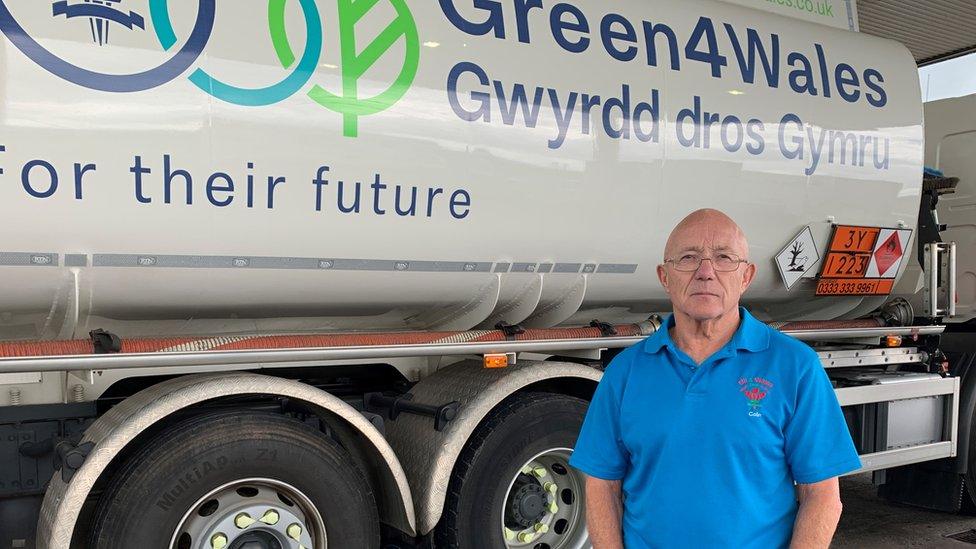Climate change: Call to power council vehicles with vegetable oil
- Published

Oil4Wales founder Colin Owens wants Welsh councils to use hydrotreated vegetable oil (HVO)
Council vehicles should be run on vegetable oil to cut carbon emissions, a fuel supplier has said.
Oil4Wales founder Colin Owens claimed hydrotreated vegetable oil (HVO) could be used instead of diesel fuel.
He said it could be used as a "stepping stone" towards cleaner solutions, delaying the need to buy replacement electric vehicles.
But an energy expert has warned doing so would only act as a stopgap.
The fuel, which is made from vegetable and animal oils or used cooking oil, currently costs around £1.94 a litre for road users - compared to around £1.51 for standard white diesel.
The Welsh Local Government Association (WLGA) said there could be "limitations in attempting to switch to electric in the case of heavy goods vehicles", and that emissions needed to be reduced in a "cost-effective way".
But energy expert Carol Bell said renewable diesel was no more than a "short term tactical solution to eke out more life from existing vehicles and systems".
"I think it does have a place, but whether it has a major place is a big question," she said.
"Ultimately to invest in this kind of production, now, we would have to recognise that it has a finite life, because we have to wean ourselves off any kind of hydrocarbon fuel in reasonably quick order."
Ms Bell said the public sector in particular needed to take a long-term view, and "ways of financing the transition for individuals and councils should be found".
Cut emissions by 90%
Mr Owens argued that if more public authorities were to use HVO or renewable diesel, the overall price for the consumer would come down.
He also said it would delay the costly replacement of vehicles.
"It reduces emissions by 90%," Mr Owens said.
"They've been using it in California for two to three years, and their carbon emissions have dramatically reduced."

How does it compare on price?
Standard white diesel : 124.83 pence per litre (ppl) (+VAT 20%)
Renewable diesel/HVO : 151.23ppl (+VAT 20%
Kerosene : 69.49ppl (+VAT 5% under 2,300 litres)
Renewable heating diesel : 118.96ppl + (VAT 20%)
(Source: OIL4WALES, prices correct on 29/8/23)

Both Cambridge and South Cambridgeshire councils found using HVO instead of diesel in their bin lorries cut carbon emissions by 90%.
Mr Owens' call has been backed by Plaid Cymru Ceredigion MP Ben Lake, who said the UK government needed to reconsider how much VAT is paid on the oil.
"I certainly think it has potential, not least because it is a drop-in fuel and many local authorities will have fleets of vehicles that could easily transition over to this fuel," Mr Lake said.
Heating rural homes
Mr Owens also argued that rural homeowners who currently use standard heating oil or kerosene can use HVO with some modifications to existing boilers.
Around 10% of Welsh households use heating oil, external, according to Welsh government figures, which equates to around 130,000 homes, mainly in rural areas.
The sale of replacement oil boilers will be banned from 2026.
The ban has been described as a "rural ULEZ" by Conservative MP George Eustice.
Rural homes will face having to replace their ageing oil boilers with either air source or ground source heating, with costs ranging anywhere between £10,000 to £20,000 to retrofit a home.
HVO is being trialled in the Cornish village of Kehelland, with 20 households using the renewable fuel instead of standard heating oil.
Fuel distributors claim it leads to a 90% reduction in carbon emissions over kerosene.

Plaid Cymru Ceredigion MP Ben Lake thinks HVO as an alternative has potential
Mr Owens has also called for fuel duty on HVO for heating to be cut to make it more competitive on price.
The UK government said it was keeping the taxation of HVO "under review".
The Welsh government said it would "continue to assess the evidence on potential market developments, the sustainability, costs and consumer impacts of biofuels".
Ministers in Wales aim to make Wales net-zero by 2050, meaning the amount of greenhouse gas emissions produced by Welsh homes and businesses would be equal to or less than the emissions removed from the environment.

ONE MAN AND HIS ISLAND: What's life like for Flat Holm Island’s newest warden?
YR WYDDFA: Life on Britain's busiest mountain

- Published27 July 2023

- Published10 July 2023

- Published15 October 2021

- Published6 June 2023
